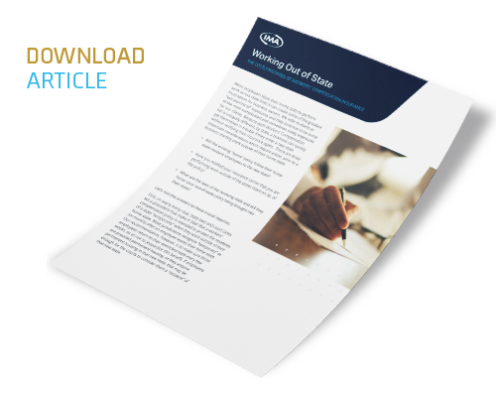Working Out of State
The Costly Mistakes of
Workers’ Compensation Insurance
When employers leave their home state to perform work across state lines it can create some of the greatest frustrations for business owners. We refer to these as “extraterritorial” exposures and they continue to be some of the most complicated and sometimes costly exposures for our clients. Because each Workers’ Compensation Act is uniquely different, by state, a business can quickly get themselves in trouble if they enter a new state without notifying their insurance agent. There are three important considerations which require action, prior to a business starting work outside of their home state:
- Will the existing “home” policy follow their home-state resident employees to the new state?
- Have you notified your insurance carrier that you are performing work outside of the states listed on 3c. of the policy?
- What are the laws of the receiving state and will they honor your out-of-state policy being brought into their state?
Let’s visit the answers to these crucial inquiries.
First, in nearly every case, state laws and court cases set a precedent that make it clear that a workers’ compensation policy is intended to protect the residents of a state “temporarily” when they work outside of their home state. Most jurisdictions recognize “temporary” as six months after an employee leaves their home state. Our recommendation, however, is to make sure those employees return to their domiciled state every few weeks, so as not to jeopardize this benefit. If employees are provided permanent housing, or they acquire permanent housing in that new state, that may be enough for the courts to consider them a “resident” of that new state.
In addition, several states “reciprocate” with one another, so they agree to allow each other’s policies to provide benefits as employees go in between those states. Several states have NO reciprocal agreements with any other state. These agreements between states can change, so one should never rely solely on an existing reciprocal agreement between states as an extension of coverage from an existing workers’ compensation policy. We have had actual situations in which two states had reciprocal agreements, but the insurance carrier refused to honor the extension of coverage into the new state beyond 30 days. This can develop serious gaps in coverage and may also result in fines and penalties against the employer, by the non-domiciled state.
Next, the policy wording in a workers’ compensation policy states that any change in exposure requires that the carrier be notified. So regardless of whether your business is expanding into other industries, or into other states, the policy contract clearly states a duty to notify the carrier.
Lastly and often more serious, are clients entering into a new state in which that state’s law requires that any business entering that state must secure that state’s coverage. (That state must be listed on 3c. of your policy declarations page or added by endorsement.) These laws often apply regardless of where the employees reside, where the business is domiciled, nor how long they will be working in that state. States such as Massachusetts, Florida and New York have routinely issued fines and penalties against clients who enter into their state without proof of that state’s coverage. New York law also requires employers carry a disability policy, in addition to a workers’ comp policy. Failure to carry either can result in substantial fines being levied.
We have had numerous situations in which a state agency will not issue a license or permit to begin work, without proof of coverage having been extended to their state. Businesses could have delays for several days as the carrier must endorse this change and upload it to the regulator’s database. Other businesses have been fined by a state because they had one of their subsidiaries listed on the policy as extending work comp coverage into that state, but were working under the name of a different subsidiary, who was not listed on the state database as having coverage. Both of these situations may result in frustrating delays and monetary fines.
Additional Information
In summary, performing work outside of your home state requires planning. Always give your agent plenty of advance notice if you intend to operate in any other state. Your carrier must be notified and the underwriter will have to determine if additional industry class codes should be added, or if the carrier has any restrictions against extending coverage to that additional state. In some instances, the carrier may not even be licensed in the new state. Failure to notify your agent/carrier can result in state penalties, work-start delays, the carrier canceling coverage, refusal to cover claims, or adding costly and unexpected payroll for these other states, upon audit.
About the Author
Sonja J. Guenther, ALCM, ARM, CIC, CRM
Sonja is a Senior Vice President and a Workers’ Compensation Specialist, responsible for understanding national trends, researching statutory issues, workers’ compensation audits/analytics and producing workers’ compensation communications for clients that will provide strategic insight towards the management of risk.
This material is for general information only and should not be considered as a substitute for legal, medical, tax and/or actuarial advice. Contact the appropriate professional counsel for such matters. These materials are not exhaustive and are subject to possible changes in applicable laws, rules, and regulations and their interpretations.
